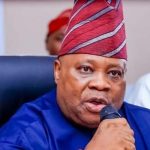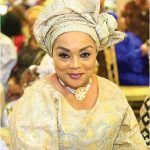...To get all news updates, Join our WhatsApp Group (Click Here)
Also Join our WhatsApp Channel (Click Here)
The Socio-Economic Rights and Accountability Project (SERAP) has filed a lawsuit against the oil producing states in Nigeria over “their failure to account for the spending of the oil derivation refunds of N625 billion recently paid to them by the Federal Government, including details and locations of projects executed with the money.”
The Federal Government recently paid N625.43 billion oil derivation refunds to the governors of Abia, Akwa Ibom, Bayelsa, Delta, Edo, Rivers, Ondo, Imo and Cross River states. The payments covered 13 per cent oil derivation, subsidy, and SURE-P refunds. The refunds date from 1999 to 2021.
In the suit number FHC/ABJ/CS/2371/2022 filed last Friday at the Federal High Court, Abuja, SERAP is asking the court to “direct and compel the governors to disclose and widely publish the details of spending of the oil derivation refunds, subsidy, and SURE-P refunds.”
SERAP is also asking the court to “compel President Muhammadu Buhari to direct anti-corruption agencies to thoroughly investigate the spending of the public funds collected by the governors, and where appropriate, ensure the prosecution of suspected perpetrators of corruption, and the recovery of proceeds of corruption.”
In the suit, SERAP is arguing that, “The Nigerian Constitution 1999 [as amended], the Freedom of Information Act, and the African Charter on Human and Peoples’ Rights impose transparency obligations on the governors to disclose the spending of the oil derivation refunds, subsidy, and SURE-P refunds.”
SERAP is also arguing that, “State governors cannot hide under the excuse that the Freedom of Information Act is not applicable to their states. The governors also have clear legal obligations to provide the information, as prescribed by the provisions of the Nigerian Constitution and the African Charter on Human and Peoples’ Rights.”
According to SERAP, “It is in the public interest and the interest of justice to grant this application. Nigerians are entitled to their constitutionally and internationally recognized human right to information.”
SERAP is also arguing that, “The constitutional principle of democracy provides a foundation for Nigerians’ right to know details of spending of public funds. Citizens’ right to know promotes openness, transparency, and accountability that is in turn crucial for the country’s democratic order.”
SERAP is also arguing that, “The public interest in obtaining the information about expenditures relating to the refunds outweighs any other interests. The oversight afforded by public access to such details would serve as an important check on the activities of the governors, and help to prevent abuses of the public trust.”
The suit filed on behalf of SERAP by its lawyers Kolawole Oluwadare and Valentina Adegoke, read in part: “The Nigerian Constitution, Freedom of Information Act, and the country’s international obligations rest on the principle that citizens should have access to information regarding their government’s activities.”
“Disclosing details of the spending of the oil derivation refunds, subsidy and SURE-P refunds would allow Nigerians to scrutinise it, and to monitor the spending of the refunds to ensure that the money is not mismanaged, diverted or stolen.”
“The effective operation of representative democracy depends on the people being able to scrutinise, discuss and contribute to government decision making, including on the spending of the oil derivation refunds.”
“To do this, they need information to enable them to participate more effectively in the management of public funds by their state governments.”
“Publishing the details of the spending of the refunds would ensure that persons with public responsibilities are answerable to the people for the performance of their duties including the management of refunds.”
“The Freedom of Information Act, Section 39 of the Nigerian Constitution, article 9 of the African Charter on Human and Peoples’ Rights and article 19 of the International Covenant on Civil and Political Rights guarantee to everyone the right to information, including about how the oil derivation refunds are spent.
“By the combined reading of the provisions of the Constitution of Nigeria, the Freedom of Information Act 2011, and the African Charter on Human and Peoples’ Rights, applicable throughout Nigeria, there are transparency obligations imposed on the state governors to publish details of spending of the oil derivation refunds.”
“Under the 13 per cent derivation fund, Abia State received N4.8bn; Akwa-Ibom received N128bn; and Bayelsa got N92.2bn. Cross River got a refund of N1.3bn; Delta State received N110bn; Edo State received N11.3bn; Imo State, N5.5bn; Ondo State, N19.4bn; and Rivers State received 103.6bn.”
“On the 13 per cent derivation fund on deductions made by NNPC, Abia State received N1.1 billion; Akwa-Ibom, N15 billion; Bayelsa, N11.6 billion; Cross River, N432 million; Delta State, N14.8 billion; Edo State, N2.2 billion; and Imo State, N2.9, billion. Ondo State got N3.7 billion while N12.8 billion was paid to Rivers State.”
“The states also received N4.7 billion each, totalling N42.34 billion as refunds on withdrawals for subsidy and SURE-P from 2009 to 2015. The Federation Account also paid N3.52billion each as refund to local government councils on withdrawals for subsidy and SURE-P from 2009 to 2015.”
No date has been fixed for the hearing of the suit.
You can get every of our news as soon as they drop on WhatsApp ...To get all news updates, Join our WhatsApp Group (Click Here)
Also Join our WhatsApp Channel (Click Here)

















